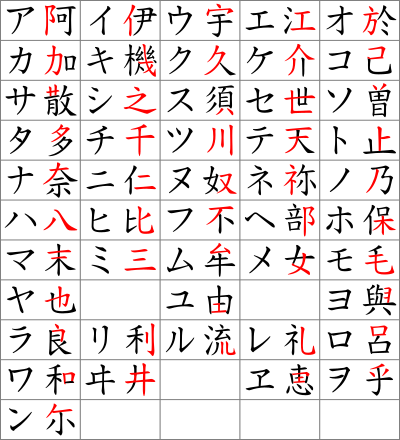
As the site says, We Japanese has no Character, no Kanji for English alphabet.
Besides, some of Characters on this chart isn't used no longer in Japan.
Therefore you must not use this chart.
By the way, then, there is no way to translate English name into Kanji ?
Yes, there is. (but I don't recommend...)
In Japan, long long ago, when we have no letter, we also start to use Chinese character for standing for Japanese pronunciation.
It is 万葉仮名(Manyo-gana).
Manyo-gana gradually changed into ひらがな(Hiragana) .
 |
| wikipedia |
Upper Kanji is original Manyo-gana.
Mid red letter is a process.
Lower letter is Hiragana.
In the same way, we changed one part of Chinese character into カタカナ(Katakana).
 |
| wikipedia |
The red part of right Chinese character is changed into Katakana.
So, If you can write your name with Hiragana, you can also do with Kanji.
For example, If your name is Emilly , Hiragana is ”えみり”, and Katakana is "エミリ".
Accordingly, You can write your name "衣美利" or "江三利".
On the other hand, We modern Japanese has certain feeling for each Kanji.
The Kanji "三" is not better.
This kanji only means " three ".
We feel "美" better than "三".
"美" has the meaning of beauty.
"美" is worthy of naming.
How about "衣" and "利"?
"衣" stands for "clothing"
"利" does for "profit", "benefit" or "sharp".
If you line these Kanji like "衣美", The meaning is " The cloth is beautiful"
We choose Kanji , thinking about such a meaning.
However, "衣美" is not a strange but popular name.
Because some people like the style of "衣", or the nice look of "衣".
Emi is often written as 恵美, 絵美, 映美, 詠美, 恵実, and so on.
"恵" is "blessing" or " -ful ". So 恵実 is "beautiful".
"詠" is "to sing" or "to compose a poem". So 詠美 is "the person to sing about beauty" or "the person to compose a poem of beauty".
Like this, ever for us Japanese, Which Kanji we choose is difficult.
Recently, The people is increasing ,who choose Kanji for his child's name without deep thinking in Japan. Such a name is called "Kirakira-name".
"Kirakira-name" means "too flashy and nonsense name".
Such being the case in Name, NAMELY, Using Kanji is difficult for us Japanese.













